- Home
- Tim Powers
Hide Me Among the Graves
Hide Me Among the Graves Read online
Page 1
BOOK I
PROLOGUE
1845: The Bedbug
I.
So I grew half delirious and quite sick,
And thro' the darkness saw strange faces grin
Of monsters at me. One put forth a fin,
And touched me clammily: I could not pick
A quarrel with it: it began to lick
My hand, making meanwhile a piteous din
And shedding human tears: it would begin
To near me, then retreat. I heard the quick
Pulsation of my heart, I marked the fight
Of life and death within me; then sleep threw
Her veil around me; but this thing is true:
When I awoke, the sun was at his height,
And I wept sadly, knowing that one new
Creature had love for me, and others spite.
- Christina Rossetti
THE FELT-PADDED BASE of the ivory bishop thumped faintly on the marble chessboard.
"Check," said the girl.
The face of the old man across the table from her was in shadow - the curtains were drawn across the street-side windows, and the chandelier overhead hung crookedly because of the gas-saving mantle screwed onto it - and all she could see under the visor of his black cap was the gleam of his thick spectacles as he peered at the chess pieces.
Both of them hated to lose.
"And mate in . . . two," he said. He sat back, blinking owlishly at the girl.
She sighed and spread her hands. "I believe so, Papa. "
The old man thoughtfully lifted the ebony king from the board and looked toward the fireplace, as if considering throwing the piece onto the coals. Instead he put it into the pocket of his robe, and when his hand reemerged it was holding instead a thumb-sized black stone statue.
Christina raised her eyebrows.
Old Gabriele's answering smile was wry. "I carry it around with me now," he said, "very close. Not that it does me any good anymore. Nothing does. "
He put it down onto the square where his king had stood, and it clicked against the marble.
Wanting to head off yet another melodramatic elaboration along the lines of his Nothing does, Christina quickly asked, "What sort of good did it once do? You've said it's buona fortuna. "
She and her sister and two brothers had seen the little statue on a high shelf in their parents' bedroom ever since they could remember, and they had even taken it down and incorporated the stumpy little stone man into their games when they were alone, but this was the first time in her fourteen years that she had ever seen it downstairs.
"It led me to your mother," he said softly, "all the way from Italy to England, and I thought it might keep us healthy and prosperous, not - not destitute and losing my sight - 'And that one talent which is death to hide, lodged with me useless. . . '"
Christina could see him blinking behind the thick lenses, and saw the glint of the tears that were always embarrassingly ready these days, especially when he quoted Milton's sonnet about going blind. She wished she had let him win the chess game.
Adopting a manner that reminded her of someone, Christina lightly quoted a later line from the same sonnet as she stood up and began to pick the chess pieces from the board: "'Doth God exact day-labor, light denied?'" And she smiled at him and went on, "'I fondly ask. '"
"Yes, you foolishly ask," he snapped. "Where is your mother, tell me that! Embroidering in the drawing room, could it be? Corpo di Bacho, where is the drawing room?"
It occurred to Christina who it was that her own indulgently dismissive manner reminded her of - her mother, comforting Christina or one of her siblings when they used to wake up from nightmares.
And she remembered that when they had been troubled by nightmares, her father had always dropped the little stone statue into a glass of salted water. She couldn't recall now whether it had ever helped.
Her mother at the moment was out at work as a day governess, and this rented house on Charlotte Street had no drawing room.
Christina had laid all the chessmen except the black king into the wooden box, and now, leaving the statue alone on the board, she knelt by her father's blanketed knees and took his cold, dry, wrinkled hand.
"How did it lead you to Mother?"
He was frowning. "'Light denied,'" he said. "I should destroy the damned thing. This is my last summer. Italy never again. "
She blew a strand of hair back from her forehead. "I won't listen to you when you talk like that. " Again she reminded herself of her mother, as if she were the parent now, and her father had become a petulant child.
"Is it a compass?" she asked.
After a moment his scowl relaxed into a grudging smile. "You were always a contrary little beast. Tantrums. Cut yourself with scissors once when your mother corrected you! I should never have told you about it. "
"Tell me about it. "
He sighed. "No, child, it's not a compass. Am I being selfish? It gives you dreams . . . that are not really dreams. "
"Like second sight?"
"Yes. I knew about . . . statues, from my days as curator of ancient statuary at the Museum of Napoli - some of them are not entirely lifeless. And I belonged to the Carbonari there, who also know more than a little about such things. "
Christina nodded, noting the black spot on his palm - he had often told the children that it was the mark of Carbonari membership.
"And then King Ferdinand outlawed the Carbonari, and I fled to Malta - but in '22, when I was thirty-five, there was an earthquake, and I," he said, scratching his palm, "sensed this little stone, north of me. A summoning compass, if you like! I sailed east of Sicily, past the Gulf of Taranto and Apuleia, many perils, all the way up the east coast of Italy to Venice, following the, the dream-song that led me to find him" - he nodded toward the tiny lone figure on the chessboard - "in the possession of an ignorant Austrian soldier. "
". . . Led you to find him. " Not it, she thought.
He freed his hand to ruffle her brown hair. "Understand, child, I had at that point nothing to lose. The Pope had already excommunicated the Carbonari. "
Christina was momentarily glad that her sister, Maria, was living with another family as a governess, for Maria was virtuous and devout; and that her brother William was at work at the government tax office in Old Broad Street, for at the age of fifteen William was already a mocking skeptic.
Her brother Gabriel, though, who was off at Sass's art academy in Bedford Square, would be intrigued. Christina wished he were here.
She nodded. "I understand. "
Hesitantly she reached her hand across toward the statue, giving her father time to tell her not to; but he made no objection, and her fingers closed around the cold thing.
Into her mind sprang the last line of the Milton sonnet: I also serve who only stand and wait. But that wasn't right - it was supposed to be They, not I.
"You shouldn't touch it," he said, now that she already had.
She let go of it and drew her hand away. "Did you buy . . . it, from the Austrian soldier?"
Her father waved his hand in front of his spectacles. "In a sense, child. "
Christina nodded. "And this little stone man gave you a - a vision of Mother? Here in England?"
"That it did, though I'd never been to England, and I fell in love with her image - and set out to find her and marry her. " He nodded firmly. "And I did. "
Christina smiled. "Love at first second sight. "
But her father's face sagged in renewed self-pity, the vertical lines around his mouth making him look like a ventriloquist's dummy. "Poor Frances Polidori! Working for wages in stra
ngers' houses now! It was a bad day for her when she became Frances Rossetti, married to this half-blind wretch who earns nothing anymore - whose only hope now is to . . . to move on, and join so many of our old friends!"
He cast a theatrical glance at the framed portrait on the far wall. It was a picture of his wife's brother, John Polidori.
Christina recalled that her uncle had committed suicide in 1821 - four years before her father found her mother. Her father couldn't ever have met the man.
"Did you put it under your pillow, like a piece of wedding cake?" she asked, springing to her feet and crossing to the street-side window.
The rings hissed on the rod as she pulled the curtains aside, letting in afternoon sunlight reflected from the row of tan-colored houses on the other side of the Charlotte Street pavement. She glanced left and right through the glass, hoping her brother Gabriel might be coming home early from the art academy, as he often did, but she didn't see his slim, striding figure among the weaving hedge of horses and carriage wheels.
From behind her came her father's frail voice: "Turn off the gas, if you're going to scorch us with sunlight! What pillow?"
She turned back to her father, and the sun glare from the windows across the street now made momentary dark webs in her vision, connecting everything in the parlor.
"In Malta," she said. "Did you put the little man under your pillow?"
"Don't touch it again, Christina," he said quietly. "I shouldn't - I should have thrown him into the sea. Yes, under my pillow, on Midsummer's Eve. "
Christina recalled that today was Midsummer's Eve - June 23. Was that why her father had brought the thing downstairs and shown it to her?
He was shaking his head, and strands of his sparse white hair were falling over his glasses. "It's a wicked trick, no good from it - you children, Hearts, Clubs, Diamonds, and Spades! Where did that come from? Eh?"
Christina smiled as she walked back across the old carpet to the table and stood on a chair to reach the stopcock at the base of the chandelier. When she and her brothers and sister had been children, they had played endless games of whist and Beggar My Neighbor in the nursery, and at some point they had each adopted one of the suits of cards: Gabriel was hearts; William, spades; Maria, clubs; and Christina was diamonds.
"I think several of us dreamed it," she said, hopping back down to the floor, "and it was fun to have . . . secret identifications. "
"Not in a house with children!" muttered the old man. "And even now, you're only fourteen! I've been a terrible father. "
Christina paused, staring at him. She and her siblings had read Maturin's eerie Melmoth the Wanderer and The Arabian Nights, and their mother often read to them from the Bible. William would scoff, but William was at work.
"Just," she said, "with it under your pillow? No . . . special rhyme to say?"
"Prayers, you should say! With a rosary under your pillow! Not what I did. . . "
"What did you do, Papa?" she asked softly. "Confess. " His mention of rosaries had reminded her that he was at least nominally Catholic, though her mother and her sister were devout Anglicans.
"Promise me you'll destroy it when I'm gone - crush it and scatter the powder into the sea. Promise. "
Not destroy it now? she thought. "I promise. "
"I - God help me. I bled on it. I rubbed some of my blood on it, first. Promise! - but where would you children be, if I had not? Is it a sin to have sired the four of you? What would have become of Frances, as she was - a governess and still unmarried at twenty-six? Now she's the wife of a professor of Italian at King's College!"
A retired professor, thought Christina, with no pension. But, "Just so," she said.
He had begun coughing piteously, and it probably wasn't all for show - he did have bronchitis again.
"Stir up the fire, vivace mia," he quavered.
Christina slid the fire screen aside and reached into the fireplace with the shovel and pushed the gray coals into a pile to make a bed for a handful of fresh lumps of coal from the iron basket on the hearth.
Then she heard her brother Gabriel's boots tapping up the steps, and a moment later heard the hallway door unlatch and swing open. The air in the parlor shifted and abruptly seemed stuffy when Gabriel strode into the room with a few whirls of the outside summer breeze still at his back.
"Salve, buona sera!" he said with cautiously preemptive cheer, tossing a couple of books onto a chair by the door and shrugging out of his coat.
Christina knew he was apprehensive about having left school early - their father often complained that Gabriel was wasting the tuition money - but her brother's first words had made her realize that she and her father had been speaking in English. Everyone in the family was fluent in both English and Italian, but old Gabriele nearly never spoke English in his home.
Her father closed his hand over the little statue and returned it to his pocket.
Christina glanced at the old man, and he very slightly shook his head. Do you mean stop speaking English now, she wondered, or stop talking about the statue?
Either way, her brother's jarring entrance - he was riffling through the mail beside the empty chessboard now, looking very much the man of the house in his shirtsleeves and waistcoat, though he was only two years older than Christina - had broken the morbid, secretive mood. Gabriel's ostentatious youth, his clear blue eyes and his untidy auburn hair, made her father seem decrepit and almost senile by comparison.
"Buona sera, Gabriel," she said, and added, still in Italian, "Would you like some tea?"
BY SEVEN O'CLOCK WILLIAM and their mother had come home from their jobs, and after the family had dispatched a platter of pasta primavera, three elderly Italian men came calling and sat with Christina's father on chairs dragged up by the fire.
Christina and her brothers sat at the window-side table, sketching and composing rhymes by lamplight while the old men argued politics in histrionic Italian on the other side of the room, airing their eternal grievances against the Pope, and the kings of France and Napoli, and the Austrians who controlled Italy.

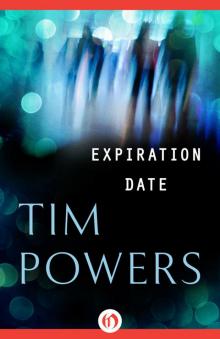 Expiration Date
Expiration Date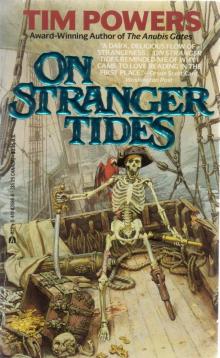 On Stranger Tides
On Stranger Tides Earthquake Weather
Earthquake Weather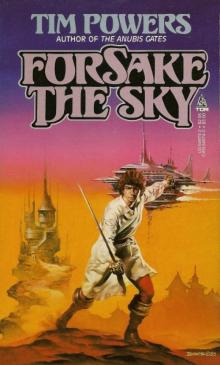 Forsake the Sky
Forsake the Sky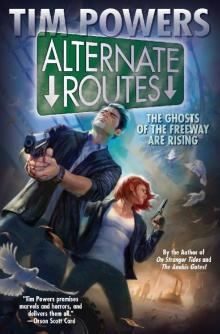 Alternate Routes
Alternate Routes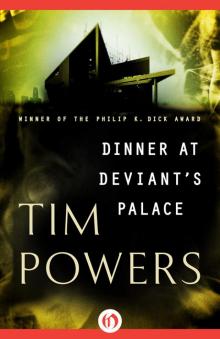 Dinner at Deviant's Palace
Dinner at Deviant's Palace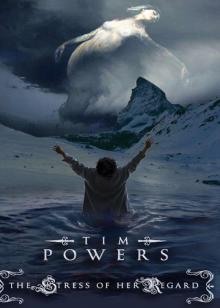 The Stress of Her Regard
The Stress of Her Regard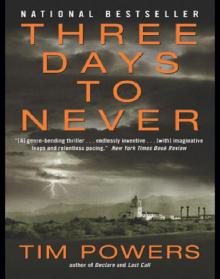 Three Days to Never: A Novel
Three Days to Never: A Novel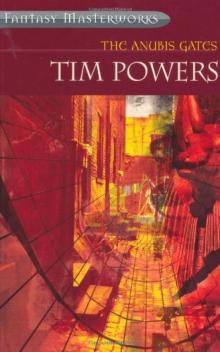 The Anubis Gates
The Anubis Gates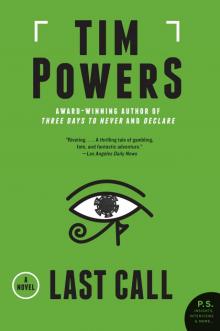 Last Call
Last Call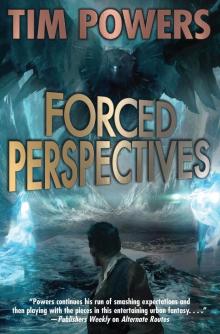 Forced Perspectives
Forced Perspectives Strange Itineraries
Strange Itineraries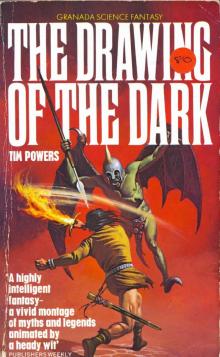 The Drawing of the Dark
The Drawing of the Dark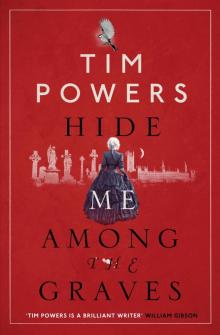 Hide Me Among the Graves
Hide Me Among the Graves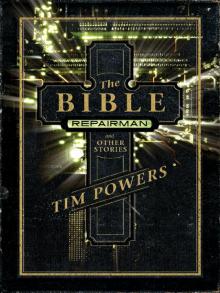 The Bible Repairman and Other Stories
The Bible Repairman and Other Stories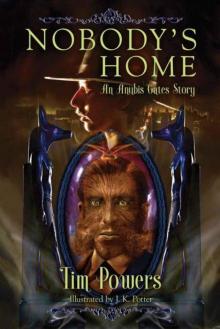 Nobody's Home: An Anubis Gates Story
Nobody's Home: An Anubis Gates Story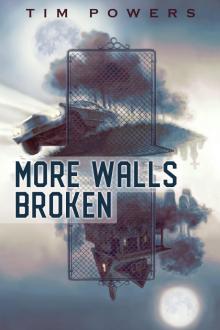 More Walls Broken
More Walls Broken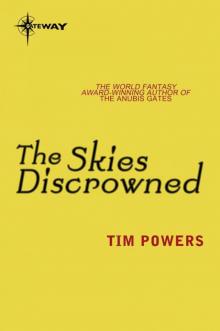 The Skies Discrowned
The Skies Discrowned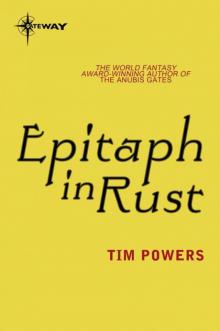 Epitaph in Rust
Epitaph in Rust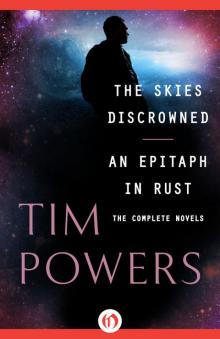 Skies Discrowned and An Epitaph in Rust
Skies Discrowned and An Epitaph in Rust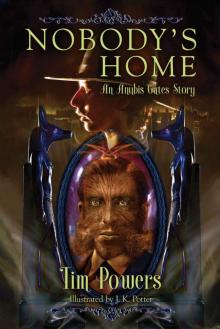 Nobody's Home
Nobody's Home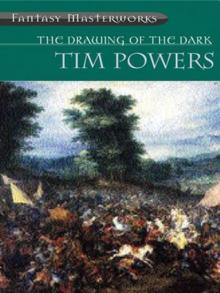 Drawing of the Dark
Drawing of the Dark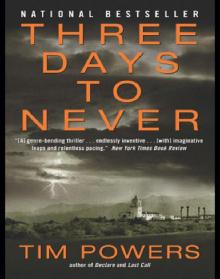 Three Days to Never
Three Days to Never